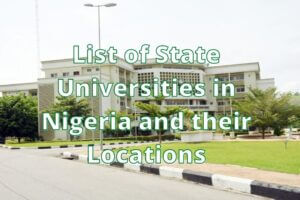WAEC is an acronym for the West African Examinations Council, an examination board that conducts the West African Senior School Certificate Examination (WASSCE) for candidates residing in Anglophone West African countries such as Ghana, Nigeria, Sierra Leone, Liberia, and The Gambia.
| Examination Name | West African Senior School Certificate Examination (WASSCE) |
|---|---|
| Year of Establishment | 1952 |
| Coordinating Body | West African Examination Council |
| Examination Period | Thrice a Year (January/February, May/June, and November/December) |
| Examination Types |
|
| WAEC Grading | A1 – Excellent, B2 – Very good, B3 – Good, C4 – Credit, C5 – Credit, C6 – Credit, D7 Pass, E8 Pass, and F9 – Fail |
| Countries Writing WAEC | Ghana, Liberia, Nigeria, Sierra Leone, and The Gambia. |
Establishment of the Council
The Council was established in 1952 with the purpose of conducting examinations in the public interest and awarding certificates that are equivalent to other certificates of examining authorities internationally.
The legislative assemblies of Nigeria, Ghana, Sierra Leone, and the Gambia passed an ordinance (West African Examinations Council Ordinance NO. 40) approving the West African Examination Council in December 1951.
The Ordinance agreed to the coordination of exams, and issuing of certificates to students in individual countries by the West African Examination Council. Liberia later issued its ordinance in 1974, at the annual meeting held in Lagos, Nigeria.
After establishing the examination council, the council called the first meeting in Accra, Ghana in March 1953. In that same meeting, five committees were formed to assist the council. These committees are the Administrative and Finance Committee, School Examinations Committee, Public Service Examinations Committee, The Professional, Technical and Commercial Examinations Committee, and the Local Committee.
WASSCE
The West African Senior School Certificate (WASSCE) is conducted thrice a year: January/February, May/June, and November/December.
| Examination | Dates |
|---|---|
| WASSCE for Private Candidates (First Series) | January/February |
| WASSCE for School Candidates | May/June |
| WASSCE for Private Candidates (Second Series) | November/December |
The WASSCE is open to students in the third year of senior secondary school, those who have taken the examinations previously, and those with three GCE O Level passes or any other qualification deemed equivalent.
In Nigeria, Candidates are required to enter and sit for a minimum of 6 core subjects which include the following: English Language, Mathematics, and at least one Nigerian Language (a waiver has been given in by the Federal Ministry of Education in Nigerian since 2003), at least one science subject (Physics, Chemistry or Biology), Literature in English, History or Geography, Agricultural Science or at least one vocational subject
The WAEC grade description: A1 – Excellent, B2 – Very good, B3 – Good, C4 – Credit, C5 – Credit, C6 – Credit, D7 Pass, E8 Pass, and F9 fail
Other Examinations Conducted
The council conducts four different categories of examinations. They are International Examinations, National Examinations, Examinations conducted in collaboration with other examining bodies, and Examinations conducted on behalf of other examining bodies.
The International exams are exams taken in the five countries with the WAEC ordinance intended for WASSCE (West African Senior School Certificate Examination).
The National examinations are taken in individual countries. They include:
- The Junior Secondary School Certificate for Nigeria and the Gambia,
- Junior and Senior High School Certificate Examinations for Liberia,
- National Primary School and Basic Education Certificate Examinations for Sierra Leone,
- Basic Education Certificate Examinations for Ghana, and
- Senior School Certificate Examinations for Ghana.
The council also coordinates examinations in collaboration with some trustworthy examination bodies. These include: City and Guilds of London Institute, Royal Society of Arts, and the WAEC Research Institute
The council also conducts examinations in West Africa on behalf of international examination bodies. These include:
- University of London GCE
- Scholastic Aptitude Test and Graduate Record Examinations for Educational Testing Service, Princeton, USA, and
- JAMB (Joint Admissions and Matriculations Board) examination in countries outside Nigeria.
The council issues credible and reliable certificates to candidates that participate in the Examinations. And the standard of these certificates matches that of the United Kingdom.
History
The West African Examination Council was formed after The University of Cambridge Local Examinations Syndicate, the University of London School Examinations Matriculation Council, and the West African Departments of Education met in 1948, concerning education in West Africa.
The meeting was called to discuss the future policy of education in West Africa. At the meeting, they appointed Dr. George Barker Jeffery (Director of the University Of London Institute Of Education) to visit some West African countries, so as to see the general education level and requirements in West Africa.
At the end of Jeffery’s three-month visit (December 1949 – March 1950) to Ghana, the Gambia, Sierra Leone, and Nigeria, he tendered a report (since known as Jeffery report) strongly supporting the need for a West African Examination Council, and making detailed recommendations on the composition and duties of the Council.
Following this report, the groups met with the governments of these countries, and they agreed on establishing a West African Examination Council, fully adopting Jeffery’s recommendations.
FAQs
What is the Acronym for WAEC/WASSCE/GCE?
| Acronym | Full Meaning |
|---|---|
| WAEC | West African Examinations Council |
| WASSCE | West African Senior School Certificate Examination |
| GCE | General Certificate Examination |
What is the difference between WAEC and WASSCE?
WAEC (West African Examinations Council) is the coordinating body while WASSCE (West African Senior School Certificate Examination) is the examination.
How many Credits are required to pass WASSCE?
Candidates only required a minimum of 5 Credits in 5 core subjects including Mathematics and English.
How many times is WAEC conducted in a year?
WAEC is usually conducted thrice a year: January/February, May/June, and November/December.
Can I combine two WAEC results from separate years?
Yes, candidates with a deficiency can combine two separate WAEC results to make up the 5 minimum Credits requirement.
Can I combine WAEC and NECO results?
Yes, candidates can combine WAEC and NECO results to make up the 5 minimum Credits requirement.
Can I combine WAEC and NABTEB results?
Yes, candidates can combine WAEC and NABTEB results to make up the 5 minimum Credits requirement.
How many countries write WAEC?
WAEC is written in 5 African countries, namely Ghana, Liberia, Nigeria, Sierra Leone, and The Gambia.
Does the WAEC result expire?
No, WAEC certificates do not have an expiry date. In other words, it is valid forever.
How many subjects can I register for WAEC?
Candidates can only register a minimum of eight (8) and a maximum of nine (9) subjects including Mathematics and English.
Where is WAEC headquarters located?
The WEAC headquarter is located in Accra, Ghana.
Full Address: Nelson Mandela Avenue, Off Gulf Street, (Behind Gulf House) Okponglo, P.O. Box GP 125, Accra, Ghana.
Phone: +233 302 – 237784/248967
Email: waechqrs@africaonline.com.gh
Website: www.waecheadquartersgh.org






